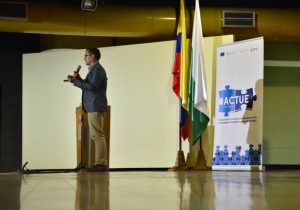
19/06/2018
ACTUE-Colombia presents the results of a study on transparency in the health system, in a search for greater integrity and transparency in the sector
The European Union Anti-Corruption and Transparency Project for Colombia (ACTUE-Colombia) presented in Medellin a study entitled “In search of greater integrity and transparency in the Colombian health system”, in conjunction with the Health Economics Group of the University of Antioquia. This is a study of the risks and practices of corruption and opacity, and of the levels of tolerance of corruption in the Colombian health system.
As its first event, the project, which is financed by the European Union and managed by FIIAPP, held a National Symposium for the academic community, the system’s stakeholders and members of the public interested in the topic to discuss the methodologies used, results and recommendations, and the possible commitments from the various system stakeholders regarding taking action against the risks identified.

The event was attended by the under-minister for Social Protection, Carmen Eugenia Davila; the deputy prosecutor-general, Luis Diaz-Granados; the director of the ACTUE-Colombia project, Karen Hussmann; the coordinator of the Anticorruption and Transparency Observatory, Aura Cifuentes; and Universidad de los Andes professor Pablo Sanabria, among others.
In addition, a Regional Seminar was held with officials from the Superintendency of Health, representatives of Health Provider Companies (ESP) and Health Provider Institutions (IPS) with the aim of publicizing the results of the study and coordinating them with the Risk-Based Supervision model designed by the Superintendency of Health. On this occasion, Luis Cruz, the national superintendent, emphasized how his institution has been working to restore trust in and the legitimacy of the sector, by promoting transparency through a series of commitments, including public participation and social control.
Between 2014 and 2018, the ACTUE-Colombia proejct has supported numerous initiatives in the Colombian health sector that were designed to provide input to a policy of transparency, the creation of independent, public information for the pharmaceutical subsector and to strengthen the transparency strategy of the National Institute for Drug and Food Surveillance (INVIMA). Further information can be found on the project’s website.